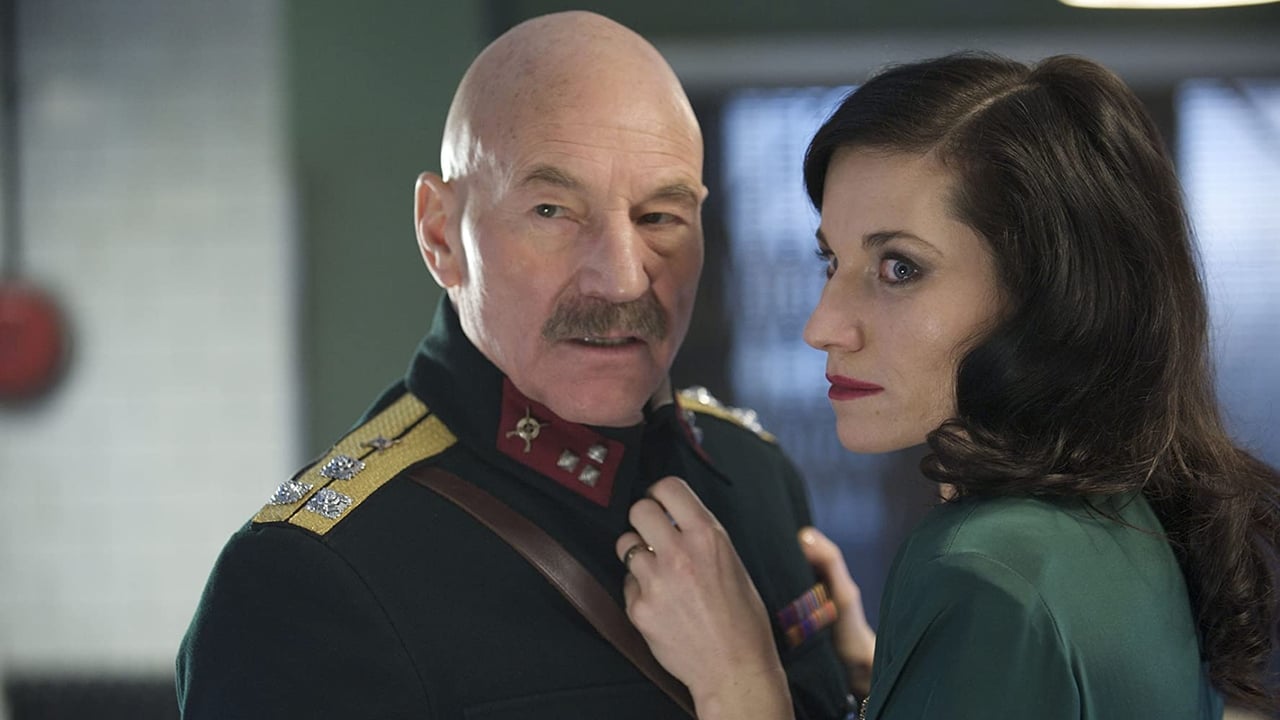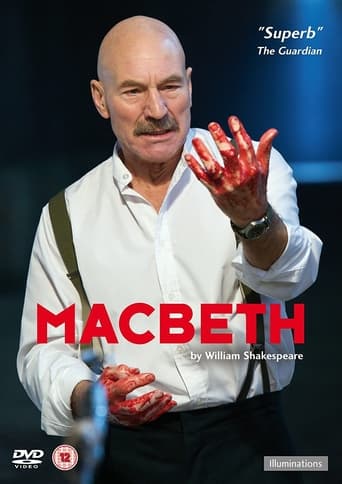

Plot: A nobleman murders and usurps his King before being destroyed by his enemies and himselfThis is the film adaptation of a highly successful stage performance which changed the setting of the play to a post-Soviet Eastern European country. The actors are, as you'd expect, excellent, with Kate Fleetwood as Lady Macbeth deserving special mention for her performance, in which she looks like a vampire squid with killer cheekbones. Unfortunately over-similar costuming, dim lighting and a surfeit of beefy white actors render many of the supporting characters somewhat indistinguishable. The setting is interesting and gives rise to some of the neater touches (the woods of Dunsinane are soldiers in ghillie suits) but is insufficiently explored - especially the ideological dimension. The main problem however is that the director is a novice. Too often there is a clear diving line between stagey, actorly scenes full of dialogue and ineptly shot but cinematic action scenes. The whole thing never quite gels together, never managing to be satisfactory as a recorded play or adapted film.Worth one viewing.
... View MoreI love all Shakespeare, but for some reason Macbeth is not among my favorite works of the Bard. Nor do I think that the brilliance of Shakespeare's darker plays are usually well-handled by directors. Consequently, I am difficult to impress when it comes to individual film or DVD productions of the play. I consider Polanski's very traditional 1971 version to be the best (a 9 rating), and my second favorite version is Jason Connery's underrated and rare 1997 production (which I rate an 8). For me, both Orson Welles', Ian McKellen's, Jeremy Brett's and now Patrick Stewart's versions rate no higher than a 7 out of 10, and that goes for Kurosawa's Throne of Blood as well. They're good, but considering how marvelously Shakespeare CAN be staged or filmed (think Branagh or Taymor), they are just not THAT good. Nicol Williamson in the BBC version was very underwhelming to me, although Jane Lapotaire as Lady Macbeth was at least as good as, perhaps better than, Francesca Annis in the Polanski version.What was wrong with Patrick Stewart's 2010 version? It had many good things and scenes in it. But I found it to be too dark (yes, such a thing is very much possible) and in places too dull and drawn-out. I liked the whole Stalin motif, but setting the play in an underground bunker just smacks of low-budget requirements. That it all sort of took place in hell was perhaps an interesting take, but it's not the kind of thing that resonates with me. I want an interesting, variegated, poetic environment; one that does Shakespeare's words justice, and provides an interesting interpretation of the scenes and phrases. A limited environment of darkness does nothing of the sort. But perhaps this all owes to the budgetary restraints. I admit they did go far with little - there were some impressive scenes here and there.Comparing this production with Ian McKellen's 1995 Richard III movie is very apt; McKellen did enact Adolf Hitler; Stewart did enact Joseph Stalin. Both productions had a war motif, a tyrant motif, murderers serving the king, etc. It is hard to believe that McKellen's RIII performance did not significantly inspire this Macbeth.Is it worth your while? Definitely. It is made by people who have an obvious understanding of staging Shakespeare, which in itself is very good. However, a fabulous masterpiece it is not. Good, but not THAT good.
... View MoreIt is true what Patrick Stewart says, in the 'extras' on this film: in the last 20 years or so we have discovered that Shakespeare was a Screenwrite. Every line of verse in this production makes sense, is clearly revealed in its meaning by the use of images, and when the monologues are delivered to the camera, you get it, you follow, you never drift off from the usual 'yadda yadda' quality that the longer speeches, even beautifully pronounced by European players, can induce in all but scholars. The nuance that Goold gets from his actors on meaning and tone is terrific to watch. It is a scary environment; it is a humans-sized environment. Real human ambition & regret & resolve are actively demonstrated--no grand pronouncements. You see how perfect the play is, how dead on. That Lady Macbeth would instantly sicken when Macbeth the King becomes the real 'man' she derides him for NOT being in the first 1/5--is utterly believable.That Macbeth would HAVE to become a testosterone ridden, bloodthirsty tyrant is clear: his only way out, as he tries to live without sleep, without 'troops of friends', without progeny.I really enjoyed watching Patrick Stewart's maturity as an actor. Every line was a discovery, a delight of "oh, that's what he's thinking". No scenery chewing, but, damn, the dude is scary at times. (watching him make and share a sandwich had me writhing). His Macbeth is masculine, vigorous, cerebral (leading to his downfall, perhaps). His foil, Kate Fleetwood as Lady Macbeth, really holds her own against him; I can see her dashing the suckling babe all right. And then hoisted by her own petard in the end, ruined by her ambition instantly, no chance to enjoy the spoils.The scene where Thane of Fife goes to England to beseech the Prince of Cumberland to come home and save Scotland really thrilled me. The actor Scot Handy gives a reading that had me utterly flummoxed ("I don't' remember this scene? Why is he talking like that? Did they re-write this? Oh, I get it!! Well done!") And to be given the enjoyment of Shakespeare all over again because an actor inhabits it newly – delicious! Later, his physical revulsion and bravery in the final speech of the play was a great note to go out on. Likewise, Fife's breathing when he gets horrifying news, these are great actors and a great director. Not to mention the playwright.I am going to buy this film.The sound track is particularly masterful. Unnatural creepy perfect sounds. And it never lets up. I'll say no more. Go listen for yourself.Nor does it ever appear as a staged film. The claustrophobic environment makes you long for fresh air. That the only outdoor scene has Banquo & Fleance in jeopardy, you are holding your breath for them, is additionally chilling.The porter as a decrepit, drunken, save-your-arse kind of Irishman was an unexpected treat. Also, the feeling of a real company was very evident. Small roles like the Queen's maid and the Doctor, the milquetoast Steward who gets his spine in the end, and the porter who delivers the great line: "The Queen, my Lord, is dead.", all fit in beautifully.There is not a clunker in the group; nor is a false note ever struck; and you cheer for the good guys and the relief of Light & the Good returning in the end.If you don't really like or 'get' Shakespeare, see this. Not ONCE does it smack of obligatory literature. It is real, tough, in your face, compelling, and the witches will Rock you! Their presentation is terrific, unexpected and utterly perfect for this version of the play. The use of the horrors of conventional medicine is a hoot. They are Macbeth's own inner demons, made patently evident when he says "Enough.", as they disappear for the last time.Much like Peter Jackson nailed the 'better & lesser angels of our nature' with the scene of Gollum talking to himself as both Smeagal & Gollum--this production holds a glass up to our ambition, recklessness & the inebriating quality of getting what you want. See it. It may save your soul. A tale of our times, written 418 years ago.
... View MoreA visually brutal adaptation of a theatrical production that combines the experience of stylized European director's theater with the documentary-film imagery of war, Stalinist totalitarianism, dystopian landscapes. The result is not as much a drama (although the acting itself is riveting) as a series of rapidly-changing tableaux that bring a striking newness to Shakespeare's language. Sir Patrick Stewart performs the role of a lifetime. As a Shakespearian actor, he manipulates Shakespeare's words so that they ring authentically, as if we are hearing them for the first time.This Macbeth channels the early Polish Roman Polanski, the imaginings of a Stanley Kubrick, the gritty grayness of 1984. It HAD to be shown as a PBS "Great Performances," for I cannot imagine it attracting a commercial audience, or even a film festival one, since it seems more like an brilliant artistic experiment that might have its most successful showing in the context of a museum. It is complex, worthy of endless dissection of words and images. My experience of it had less emotion involvement than fascination with creative process behind the filmmaking.
... View More